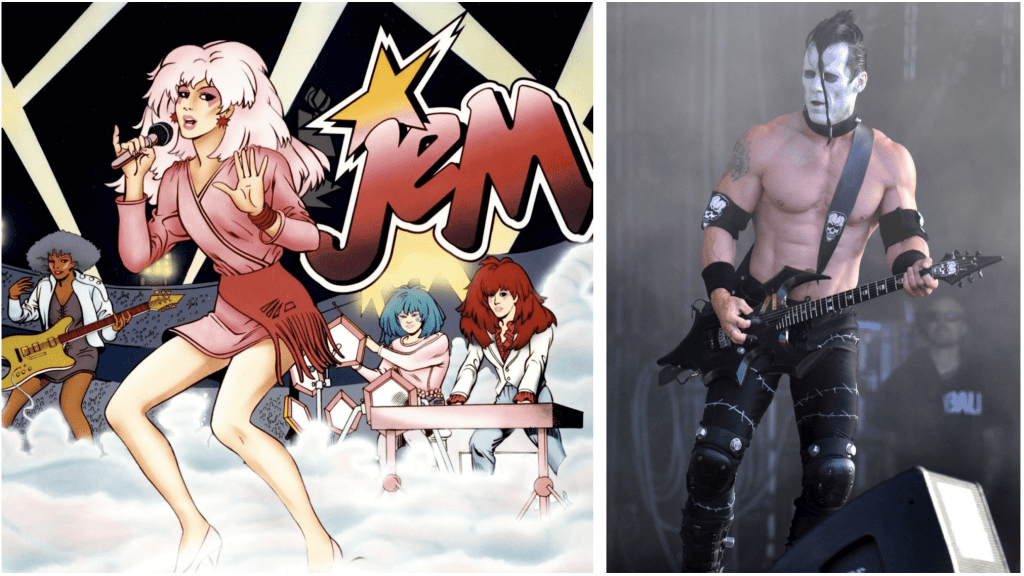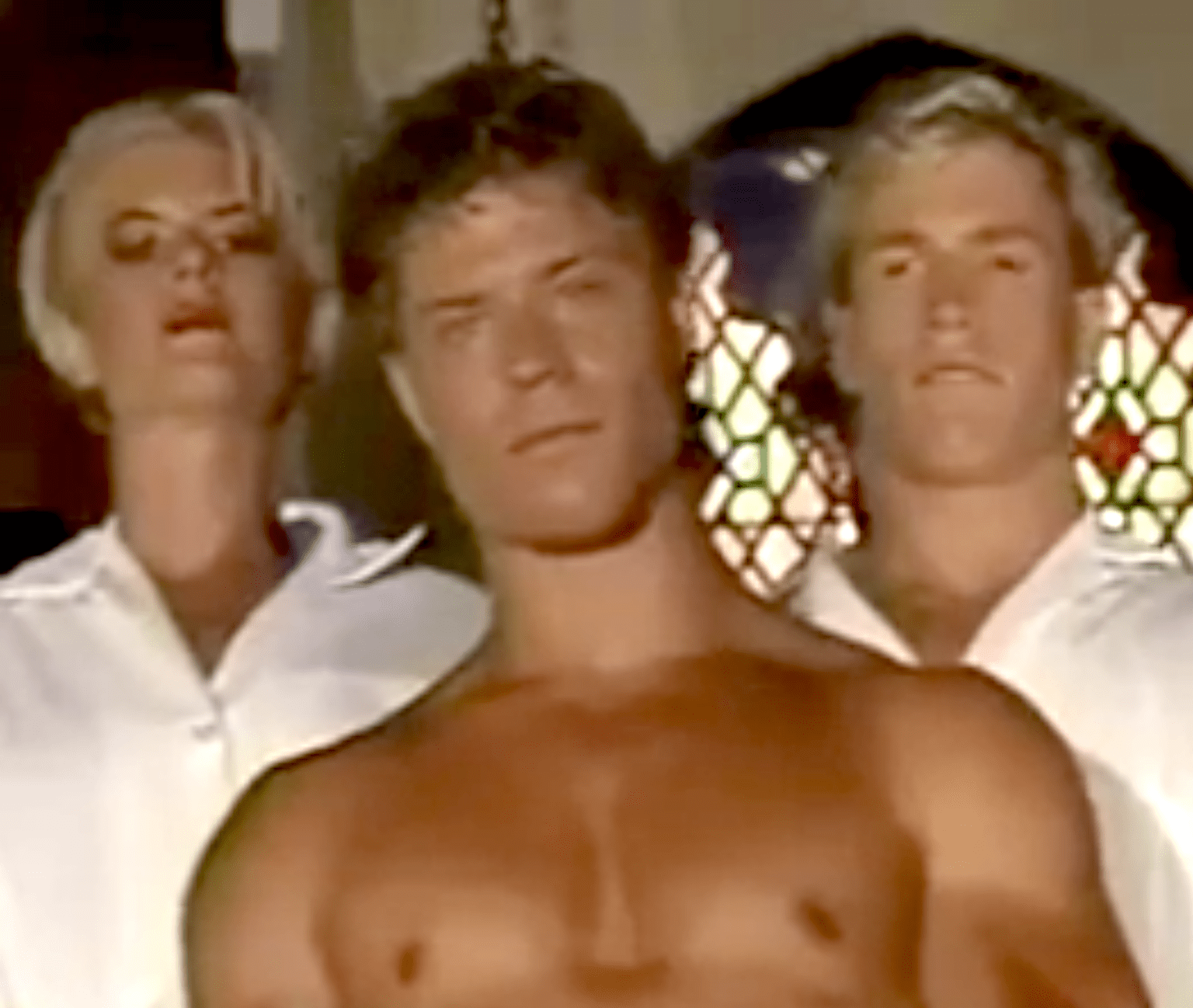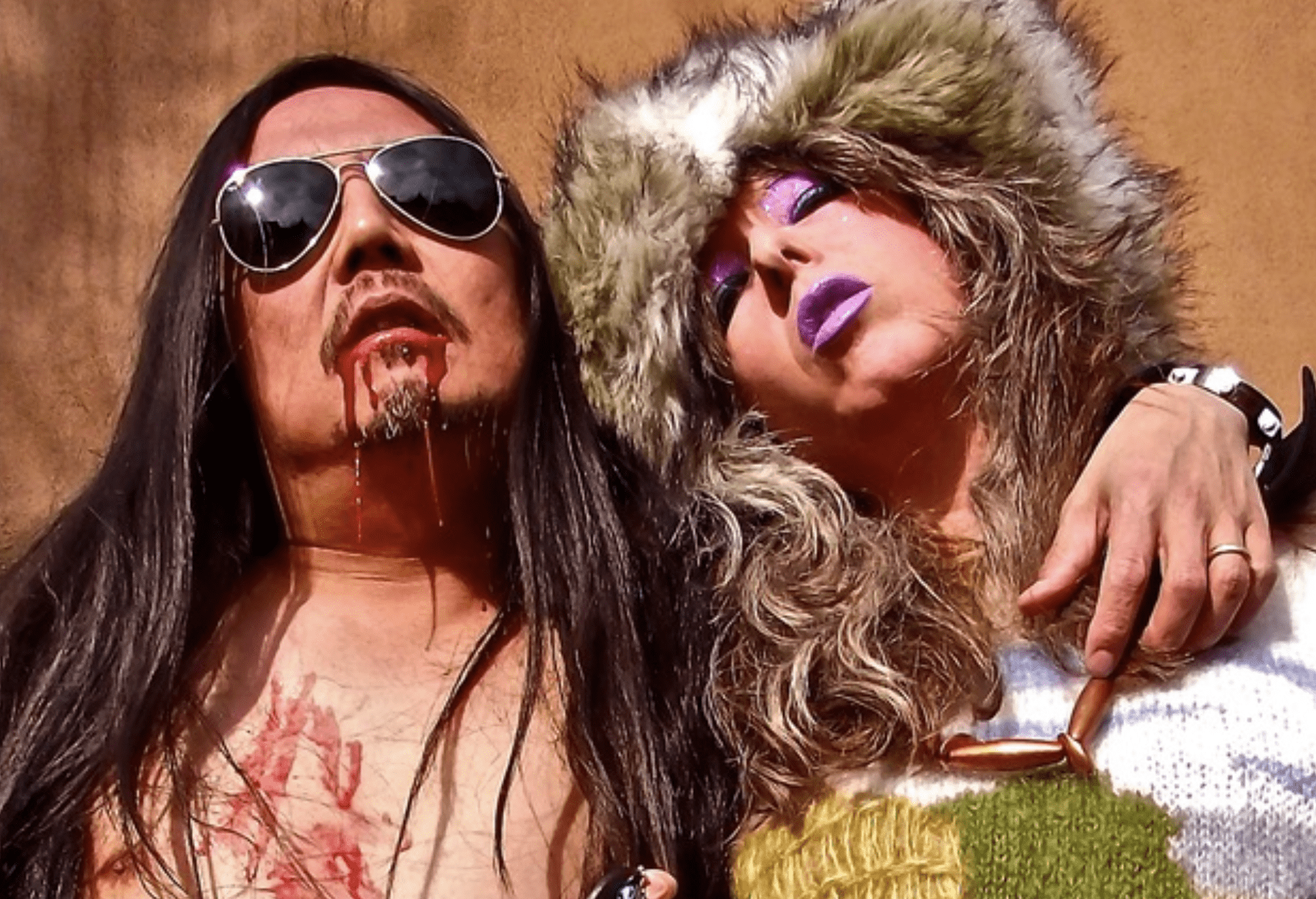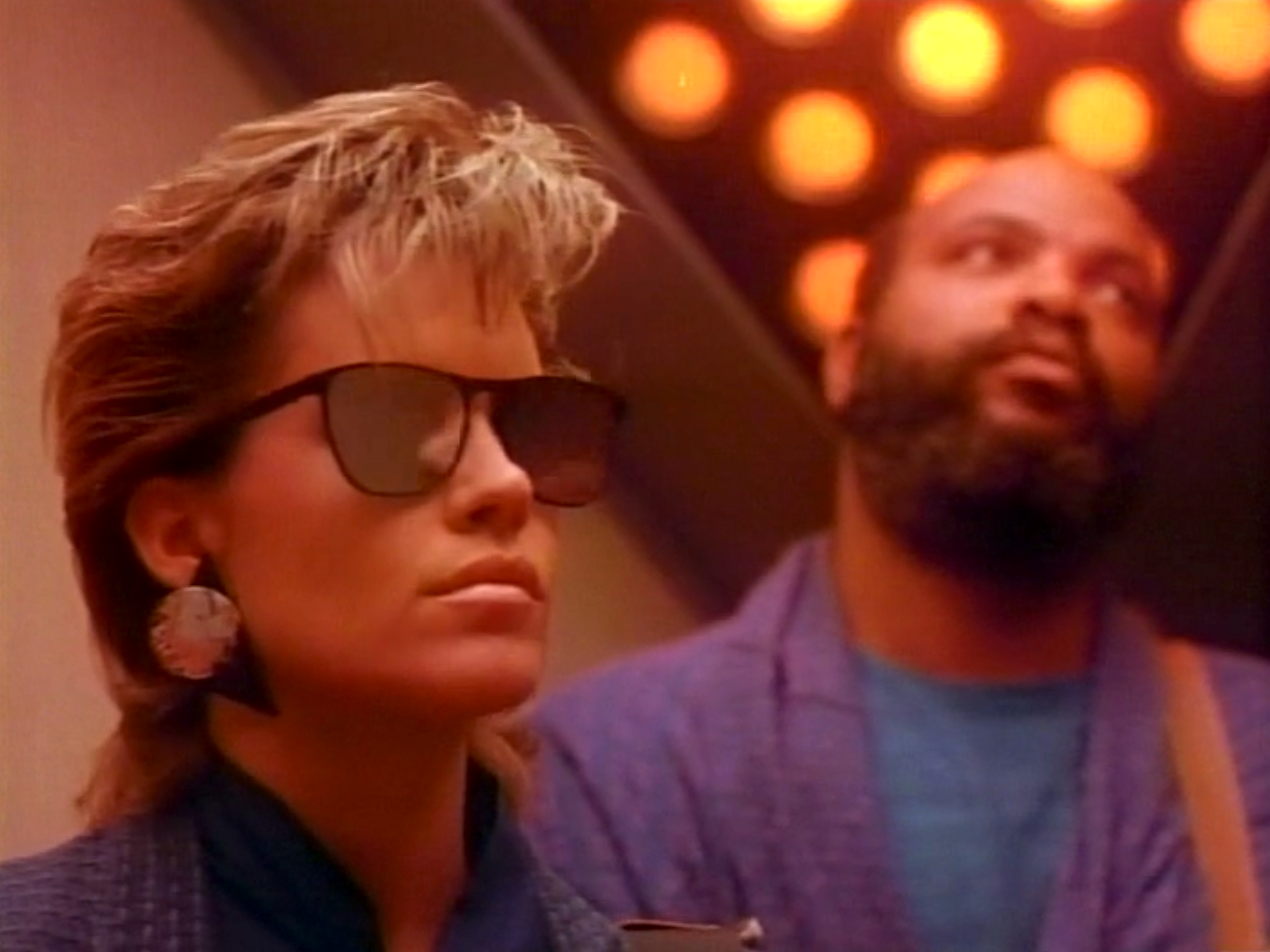
Desperate Teenage Lovedolls is a piece of shit, but that’s what it wants to be. It’s a punk film, about a punk band, doing punk things, so fuck off if you don’t like it. Like all punk, Desperate Teenage Lovedolls is a weird mixture of anger, trolling, nihilism, and earnest sincerity. As a movement, punk is a form of art rebellion with a long history that predates the 1970s. It’s an eruption of frustration that periodically emerges from the margins of civilization to challenge societal norms and mainstream culture. It’s a loose affiliation of outcasts who find solidarity in their pissed-off rejection of almost everything.
Desperate Teenage Lovedolls is a product of this attitude. Dave Markey wrote it, directed it, filmed it, edited it, produced it, and promoted it. I can’t imagine that it was very difficult. He got himself a cheap 8mm camera and just started shooting. Cavalier or not, the film has a very particular sense of humor that outlines a unique worldview. Markey would probably laugh at me for taking any of it seriously, but adolescent or not, punk constitutes an important re-emerging movement that helps bring about change.
Markey comes out of the hardcore scene. He worked with bands like Black Flag, The Meat Puppets, and The Circle Jerks, bands that fueled my own early college days of rebellion and so have a special place in my heart. Songs like The Circle Jerks’ I Don’t Care, which is simply a list of all the things they don’t care about, are equal parts liberating and infuriating. As a piece of low-fi rebellion, Desperate Teenage Lovedolls has a lot in common with John Waters' films. Both Markey and Waters were dedicated to making trashy films that impugned everyone and everything. If it makes any sense, I think Waters was more serious about what he was doing. There are more layers and thought that go into a Waters film, whereas Markey is mostly having a good time. It was people like Waters who laid the groundwork for people like Markey.

Markey actually pays homage to several sources in his film. One of the characters is seen reading Valley of The Dolls, another is watching Dawn: Portrait of a Teenage Runaway on TV. The plot of Desperate Teenage Lovedolls is intentionally formulaic. A ragtag bunch of street girls get together to form a band called The Lovedolls. They are picked up and exploited by a sleazy promoter, and eventually clash with another all-girl group called The She-Devils. Sometimes the movie feels like an episode of the 1980s cartoon series Jem and the Holograms, where the glamorous all-girl rock band Jem and The Holograms must compete against the evil all-girl rock band, The Misfits. No, not those Misfits, that would be a very different cartoon, although watching Michael Graves go head-to-head against Jem would be extremely entertaining.

For a rock-n’-roll movie, there is quite a lot of murder in Desperate Teenage Lovedolls. The Lovedolls don’t play around. The lead singer of the band is named Patch, and when her mother gets in the way, Kitty, the drummer, murders her. When Patch learns about the murder, she casually thanks Kitty as if she had remembered to pick up some milk on the way home. The film is peppered with weird little moments of humor, like when the sleazy promoter is planning the girls' first concert, he casually suggest having the Beatles get back together so they can open for the Lovedolls.

The strangest line comes when the girls are plotting to drug their promoter. One of them takes out a vial of liquid and whispers, “This minertia-blue will set that skunk straight. There's enough in here to keep all the Hindus of Calcutta flying for a year.” It does indeed send him on quite a bad trip, with flashing lights and lots of camera zooms. The best part is when he is confronted by a giant looming advertisement for Barbara Streisand’s Yentl. The poster sends him flying into a terrified rage.

Desperate Teenage Lovedolls was made in 1984. Two years later, Markey made a sequel called Lovedoll Superstar. It’s slightly more polished, sort of. There is more dialogue, and the scenes are a little more coherent. I’m not entirely sure if that’s a good thing or a bad thing. You don’t want to be caught trying too hard when you’re a punk.
Lovedoll Superstar is about Patch, the lead singer of the defunct Lovedolls, and Kitty, the drummer, trying to get the band back together. It sounds simple enough, but the movie careens between unrelated subplots and weird twists like a sarcastic and deranged pinball machine.
The band reforms with the help of a Jesus cult that Kitty runs. The fans of the band mingle with the religious fanatics to form a motley crew of Manson-like zealots. One young, blonde, trans punk boy approaches Kitty and tells her that he has sold his mother’s wedding ring and forged his dad’s signature on his Dad’s paycheck, but was unable to sell the family car. Kitty is pissed and asks him why he didn’t sell the car. The poor boy explains that his parents wouldn’t let him. Kitty gives him a sword, and he looks back meekly and asks, “Kill my parents?” Kitty answers, “Go ahead, it’s for Jesus!”

Then there is the young gas station attendant who drops some acid and is visited by a vision of Patch, who hands him a gun and tells him to kill Bruce Springsteen. There is also the musical number in the garbage dump, and the bloody, cannibalistic murder of a record executive. The Lovedolls' cult beat and stab the exec to death in the street, and then lap up his blood like ambrosia. Lovedoll Superstar,like Desperate Teenage Lovedolls,includes quite a few murders. Patch uses her Long Neck Gibson SG as a murder weapon more than as a guitar. Oh, and then there is a woman named Patty Hearst, who looks like Patty Hearst and wants to kill the Lovedolls for killing her daughter Tammy, who was the lead singer of The She-Devils from the first movie. Hearst meets up with Matt, who used to be Tammy’s boyfriend. Hearst, Matt, and Switchblade Suzie, who I think was once a member of The She-Devils, team up to hunt down Kitty and Patch.

Meanwhile, Rainbow, the brother of the record executive, not the record executive the cult murdered, but the one the Lovedolls killed with the minertia blue in the first movie, has found out that the Lovedolls murdered his brother. Matt has been living on a hippie commune somewhere in the desert near L.A. and has become a groovy peacenik, so he doesn’t seek revenge, but all the murder and strife of the big city is driving him insane. He meets up with the gas station boy who is supposed to kill Springsteen. He, the gas station boy, not Springsteen, is still being assailed by hallucinatory visions and is attacked by a doll of Gene Simmons, who turns him into a Simmons lookalike, complete with face paint. The boy finally finds Bruce Springsteen, who turns out to be Brews Springsteen, a punk Bruce Springsteen impersonator. The poor brain-addled boy runs up on stage and yells, “Who’s the Boss now, motherfucker!” and shoots the unsuspecting Brews.

I could keep going, but I think you get the idea. It’s really quite a lot of fun. Not good, clean fun, but bloody, heroin-soaked rock-n’-roll fun. Everyone seems to be taking heroin and no one seems the least bit sleepy. It seems that heroin is a pretty potent stimulant that helps you spring into action. I guess my high school health teacher got it wrong.
The soundtrack for Lovedolls Superstar was released on SST Records and includes some good screaming hardcore, although the songs from the Lovedolls sound much more like The Donnas than a punk band. No shade on The Donnas though, they rock.

I won't give away the ending, but it involves Jello Biafra as the President of the United States and the Lovedolls on tour in outer space. In the closing credits, it says that Vicki Peterson, lead singer of The Bangles, played Jeanie, but I can’t figure out who Jeanie was. The movies are trashy and ridiculous, but they capture the punk ethos pretty well. There is an underpinning of angry political rebellion that provides a foundation for the frustrated sarcasm of a disillusioned generation facing down the Reagan years. It’s fun and games played at society’s expense.

If you enjoyed this article you might also enjoy - https://filmofileshideout.com/archives/wild-zero-a-cross-cultural-meat-grinder/




[…] the charismatic Tony Coca-Cola and would have fit right in with The Velvet Underground or Iggy Pop. Punk back then was somewhat split between the aggressive thumping of bands like The Sex Pistols and The […]